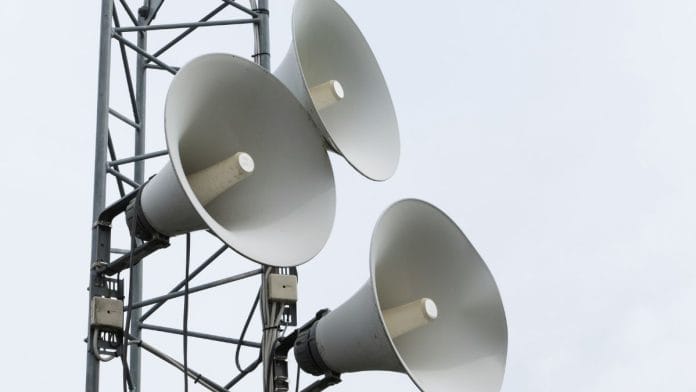New Delhi: Two orders from the Bombay and Allahabad High Courts over the past week have reignited the debate over the use of loudspeakers at religious sites, with both rulings reaffirming that loudspeaker use is not integral to religious practice, and must adhere to noise pollution regulations.
On 23 January, the Bombay High Court directed for strict action against religious institutions violating noise pollution norms by using loudspeakers beyond permissible decibel limits. Emphasising that loudspeakers are not essential to any religion, the court instructed the Maharashtra government to implement systems to automatically control noise levels at religious sites.
This decision follows complaints from residents of Nehru Nagar in Kurla East and Chunabhatti in Mumbai about excessive noise from loudspeakers, with levels exceeding the legal limits of 55 decibels during the day and 45 at night.
The Bombay High Court underscored the non-essential nature of loudspeakers in religious activities. A division bench of Justices A.S. Gadkari and S.C. Chandak directed strict enforcement of noise pollution norms and regulations. The court labelled noise pollution a significant health hazard and emphasised that denying the use of loudspeakers does not infringe upon religious rights.
Similarly, the Allahabad High Court, in an order on 22 January, emphasised that religious places are primarily intended for offering prayers, and the use of loudspeakers cannot be claimed as a matter of right, particularly when such usage often causes inconvenience to nearby residents.
The observation came while dismissing a writ petition filed by Mukhtiyar Ahmad, who sought a directive from the state authorities to allow the installation of loudspeakers at a mosque.
The bench, comprising justices Ashwani Kumar Mishra and Donadi Ramesh, supported the state’s objection to the petition’s maintainability, highlighting that the petitioner was neither the mosque’s mutawalli (Muslim priest) nor had any ownership rights over it.
The court ruled that the petitioner lacked locus standi. It reiterated that loudspeakers are not an essential part of religious practices, further noting that their use is not a protected fundamental right.
Also Read: Gyanvapi to Sambhal & Ajmer Sharif, SC order on Places of Worship Act likely to impact 11 sites
Past rulings
The use of loudspeakers in religious places of worship has been debated in the courts earlier as well. Both Bombay and Allahabad High Courts have addressed the issue before this.
In August 2016, Bombay High Court had ruled that no religion or sect could claim that the right to use a loudspeaker or a public address system was a fundamental right conferred by Article 25 (freedom of conscience, and right to practise, profess and propagate religion) of the Constitution of India.
On 26 June, 2018, the Uttarakhand High Court set a five-decibel limit for loudspeakers, telling the state government that the use of loudspeakers, even during the day, would be contingent on the user signing an undertaking that the noise level would not exceed five decibels.
In another case, in November 2021, the Karnataka High Court had asked the state government to explain the provisions of the law under which loudspeakers and public address systems had been allowed in mosques, and what action was being taken to restrict their use.
The division bench, headed by Chief Justice of Karnataka High Court, Ritu Raj Awasthi, was hearing a petition filed by Girish Bharadwaj over sound pollution caused by mosques in Bengaluru’s Thanisandra. He sought the court’s direction for effective implementation of the law related to containing sound pollution.
Similarly, in 2022, Allahabad High Court had emphasised that religious places are meant for offering prayers, and that the use of loudspeakers is not a right if it causes nuisance. This judgment highlights the court’s stance on maintaining public order and communal harmony over the unrestricted use of loudspeakers in religious settings.
Back in 2005, the Supreme Court had ruled that while religious practices are fundamental, the use of loudspeakers for religious activities must adhere to noise regulations to protect public peace, health and privacy. This decision emphasised that public well-being should take precedence over disturbances caused by sound pollution.
The apex court had made it clear that nobody, whatever be the religion or purpose, “can claim a right to create noise even in his own premises, which would travel beyond his precincts and cause nuisance to neighbours or others”.
“No one can claim a fundamental right to create noise by amplifying the sound of his speech with the help of loudspeakers,” the top court had ruled. It had also stressed the need to equip government officials with audio meters to keep noise levels in check, making it clear that no one should beat a drum or tom-tom, blow a trumpet, or beat or sound any instrument.
(Edited by Radifah Kabir)
Also Read: Supreme Court keeps ‘close watch’ on Sambhal, bars revival of well in disputed Shahi Jama Masjid







Does this judgement include playing loud sermons,songs and other high decibel usage beyond permissible limits, of all faith. Or is it only about adhaan which is a call for prayer of muslims which takes around five minutes per prayer for five times in a day.